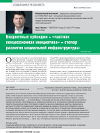Budget Subsidies + “Private Concession Initiative” = Stopper for Social Infrastructure Development
DOI: https://doi.org/10.33917/es-6.180.2021.30-39
The overwhelming majority of social infrastructure facilities remain in state ownership, requiring special formats for attracting private investment without possibility of disposition and loss of their destination. Mechanism of public-private partnership doesn’t leave any other option for such projects, and the “private concession initiative”, which has become widespread in recent years, is best suited for projects focused on commercial activities, although this limits its application to social facilities. Non-competitive basis of this format relies on the market offer of the investor, whose rationality does not imply social behavior and whose activity is obviously not intended for budgetary participation. Recently, there has been an increase in cases of government authorities taking commitments on budgetary co-financing of agreements concluded as a result of such initiatives, which is often fraught with systemic violations of budgetary legislation. Connivance of the control-supervisory and judicial authorities results in formation of skewed law enforcement practice, in 36.2% of projects investors receive
additional rental income from the budget, objectively not justified. This not only results in budget overpayments, but also devalues competitive formats that were previously quite successful — at present only 1/5 of social projects are concluded through a competitive process.
Источники:
1. Kireeva A.V. Sovremennye problemy institutsional’nogo regulirovaniya ekonomicheskikh otnoshenii v sfere gosudarstvenno-chastnogo partnerstva [Modern Problems of Institutional Regulation of Economic Relations in the Field of Public-Private Partnership]. Vestnik Evraziiskoi nauki, 2020, no 4, available at: https://esj.today/PDF/56ECVN420.pdf.
2. Kudelich M.I. Pryamoe soglashenie v proektakh s gosudarstvennym uchastiem: sravnitel’no-pravovoi analiz [Direct Agreement in Projects with State Participation: Comparative Legal Analysis]. Finansovyi zhurnal, 2019, no 6, pp. 57–69, available at: DOI: https://doi.org/10.31107/2075-1990-2019-6-57-69.
3. Ponomarev R.V. Osobennosti regulirovaniya kontsessionnykh soglashenii v zarubezhnykh stranakh [Peculiarities of Regulating Concession Agreements in Foreign Countries]. Innovatsii i investitsii, 2015, no 8, pp. 66–70.
4. Istomina N.A. Konkurentsiya za byudzhetnye sredstva v kontseptsii byudzhetirovaniya, orientirovannogo na rezul’tat [Competition for Budgetary Funds in the Concept of Performance-Based Budgeting]. Finansovaya analitika: problemy i resheniya, 2014, no 29, pp. 41–47.
5. Gavrilova Yu.A. Monitoring praktiki primeneniya zakonodatel’stva o kontraktnoi sisteme i perspektivy ego sovershenstvovaniya [Monitoring the Practice of Applying Legislation on the Contract System and Prospects for Its Improvement]. Monitoring pravoprimeneniya, 2019, no 3, pp. 36–42, available at: DOI: https://doi.org/10.21681/2226-0692-2019-3-36-42.
6. Belozor F.I. Zakupki dlya gosudarstvennykh nuzhd: garmonizatsiya dobrosovestnoi konkurentsii i ekonomicheskoi effektivnosti [Public Procurement: Harmonizing Fair Competition and Economic Efficiency]. Gosudarstvennoe i munitsipal’noe upravlenie. Uchenye zapiski, 2021, no 1, available at: DOI: https://doi.org/10.22394/2079-1690-2021-1-1-93-101.



